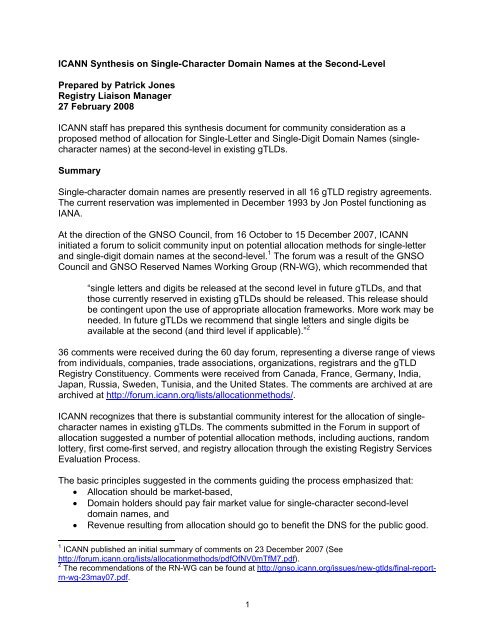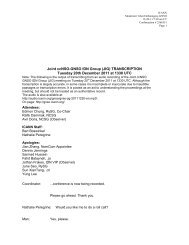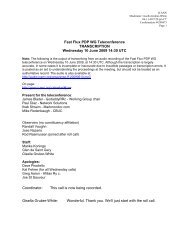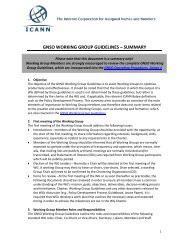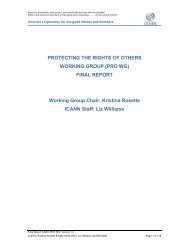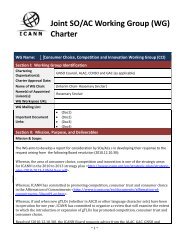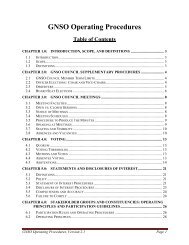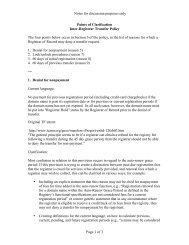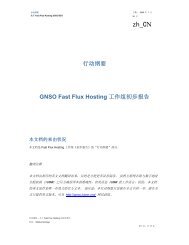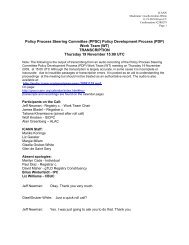ICANN Synthesis on Single-Character Domain ... - GNSO - icann
ICANN Synthesis on Single-Character Domain ... - GNSO - icann
ICANN Synthesis on Single-Character Domain ... - GNSO - icann
Create successful ePaper yourself
Turn your PDF publications into a flip-book with our unique Google optimized e-Paper software.
<str<strong>on</strong>g>ICANN</str<strong>on</strong>g> <str<strong>on</strong>g>Synthesis</str<strong>on</strong>g> <strong>on</strong> <strong>Single</strong>-<strong>Character</strong> <strong>Domain</strong> Names at the Sec<strong>on</strong>d-Level<br />
Prepared by Patrick J<strong>on</strong>es<br />
Registry Liais<strong>on</strong> Manager<br />
27 February 2008<br />
<str<strong>on</strong>g>ICANN</str<strong>on</strong>g> staff has prepared this synthesis document for community c<strong>on</strong>siderati<strong>on</strong> as a<br />
proposed method of allocati<strong>on</strong> for <strong>Single</strong>-Letter and <strong>Single</strong>-Digit <strong>Domain</strong> Names (singlecharacter<br />
names) at the sec<strong>on</strong>d-level in existing gTLDs.<br />
Summary<br />
<strong>Single</strong>-character domain names are presently reserved in all 16 gTLD registry agreements.<br />
The current reservati<strong>on</strong> was implemented in December 1993 by J<strong>on</strong> Postel functi<strong>on</strong>ing as<br />
IANA.<br />
At the directi<strong>on</strong> of the <strong>GNSO</strong> Council, from 16 October to 15 December 2007, <str<strong>on</strong>g>ICANN</str<strong>on</strong>g><br />
initiated a forum to solicit community input <strong>on</strong> potential allocati<strong>on</strong> methods for single-letter<br />
and single-digit domain names at the sec<strong>on</strong>d-level. 1 The forum was a result of the <strong>GNSO</strong><br />
Council and <strong>GNSO</strong> Reserved Names Working Group (RN-WG), which recommended that<br />
“single letters and digits be released at the sec<strong>on</strong>d level in future gTLDs, and that<br />
those currently reserved in existing gTLDs should be released. This release should<br />
be c<strong>on</strong>tingent up<strong>on</strong> the use of appropriate allocati<strong>on</strong> frameworks. More work may be<br />
needed. In future gTLDs we recommend that single letters and single digits be<br />
available at the sec<strong>on</strong>d (and third level if applicable).” 2<br />
36 comments were received during the 60 day forum, representing a diverse range of views<br />
from individuals, companies, trade associati<strong>on</strong>s, organizati<strong>on</strong>s, registrars and the gTLD<br />
Registry C<strong>on</strong>stituency. Comments were received from Canada, France, Germany, India,<br />
Japan, Russia, Sweden, Tunisia, and the United States. The comments are archived at are<br />
archived at http://forum.<strong>icann</strong>.org/lists/allocati<strong>on</strong>methods/.<br />
<str<strong>on</strong>g>ICANN</str<strong>on</strong>g> recognizes that there is substantial community interest for the allocati<strong>on</strong> of singlecharacter<br />
names in existing gTLDs. The comments submitted in the Forum in support of<br />
allocati<strong>on</strong> suggested a number of potential allocati<strong>on</strong> methods, including aucti<strong>on</strong>s, random<br />
lottery, first come-first served, and registry allocati<strong>on</strong> through the existing Registry Services<br />
Evaluati<strong>on</strong> Process.<br />
The basic principles suggested in the comments guiding the process emphasized that:<br />
• Allocati<strong>on</strong> should be market-based,<br />
• <strong>Domain</strong> holders should pay fair market value for single-character sec<strong>on</strong>d-level<br />
domain names, and<br />
• Revenue resulting from allocati<strong>on</strong> should go to benefit the DNS for the public good.<br />
1 <str<strong>on</strong>g>ICANN</str<strong>on</strong>g> published an initial summary of comments <strong>on</strong> 23 December 2007 (See<br />
http://forum.<strong>icann</strong>.org/lists/allocati<strong>on</strong>methods/pdfOfNV0mTfM7.pdf).<br />
2 The recommendati<strong>on</strong>s of the RN-WG can be found at http://gnso.<strong>icann</strong>.org/issues/new-gtlds/final-reportrn-wg-23may07.pdf.<br />
1
A majority of commenters that favored the allocati<strong>on</strong> of single-letter names recommended<br />
aucti<strong>on</strong>s as the preferred method of objectively allocating scarce resources such as singlecharacter<br />
domain names at the sec<strong>on</strong>d-level. This was supported by studies released<br />
outside this solicitati<strong>on</strong>. Many comments encouraged <str<strong>on</strong>g>ICANN</str<strong>on</strong>g> to work with qualified and<br />
trusted third parties to manage the aucti<strong>on</strong> process in order to avoid gaming and<br />
manipulati<strong>on</strong>. Several different aucti<strong>on</strong> models were recommended. Most comments<br />
indicated that the recommendati<strong>on</strong>s were intended to provide fairness and revenue<br />
generati<strong>on</strong>.<br />
The comments also recommended a range of uses of allocati<strong>on</strong> proceeds, including funding<br />
for: the promoti<strong>on</strong> of security and stability, standards development organizati<strong>on</strong>s, Internet<br />
community needs, offsetting registrati<strong>on</strong> fees, improving Internet infrastructure, supporting<br />
ccTLDs, supporting capacity building, and building <str<strong>on</strong>g>ICANN</str<strong>on</strong>g>’s reserve fund.<br />
I. Background<br />
Currently, all 16 gTLD registry agreements provide for the reservati<strong>on</strong> of single-character<br />
names at the sec<strong>on</strong>d-level. 3 Letters, digits and the hyphen symbol are allowed within<br />
sec<strong>on</strong>d-level names in both generic top level and country code TLDs. <strong>Single</strong> letters and<br />
numbers also are allowed as IDNs -- as single-character Unicode renderings of ASCII<br />
compatible (ACE) forms of IDNA valid strings.<br />
The current reserved name policy was implemented in December 1993, when J<strong>on</strong> Postel<br />
(under the IANA functi<strong>on</strong>) took steps to reserve all available single character letters and<br />
numbers at the sec<strong>on</strong>d-level, “for future extensibility of the Internet” (see 20 May 1994 email<br />
from J<strong>on</strong> Postel, http://ops.ietf.org/lists/namedroppers/namedroppers.199x/msg01156.html).<br />
Only six (q.com, x.com, z.com, i.net, q.net, and x.org) of the possible 144 single letters or<br />
numbers at the sec<strong>on</strong>d-level in .COM, .EDU, .NET and .ORG were registered prior to this<br />
reservati<strong>on</strong>. Those six registrati<strong>on</strong>s were registered prior to the reservati<strong>on</strong> in 1993.<br />
There are currently 281 TLDs in the root z<strong>on</strong>e (21 gTLDs, 249 ccTLDs and 11 evaluative<br />
IDN translati<strong>on</strong>s of .TEST). Although nearly all single-character domain names are reserved<br />
in gTLDs, 24% of ccTLDs (60) have at least <strong>on</strong>e single-character name registrati<strong>on</strong>. In<br />
February 2007, IANA c<strong>on</strong>ducted a survey of single-character delegati<strong>on</strong>s in 249 ccTLDs.<br />
Out of 8964 possible combinati<strong>on</strong>s of single-character ASCII names (c<strong>on</strong>taining 26 letters,<br />
10 numbers, but not symbols, across 249 ccTLDs), 1225 delegati<strong>on</strong>s (13.7%) of singlecharacter<br />
ASCII names exist in the TLD z<strong>on</strong>es (see http://forum.<strong>icann</strong>.org/lists/gnso-rnwg/msg00039.html).<br />
<str<strong>on</strong>g>ICANN</str<strong>on</strong>g> has received many inquiries from third parties seeking to register single-character<br />
domain names, has advised these parties that the names are reserved, and informed these<br />
parties that the reservati<strong>on</strong> can be removed through a bottom-up process. <str<strong>on</strong>g>ICANN</str<strong>on</strong>g><br />
established the forum <strong>on</strong> single-character names following its bottom-up, multi-stakeholder<br />
3 The single-character sec<strong>on</strong>d-level domain names in .COM, .NET and .ORG are already reserved in the<br />
name of IANA. This is different from other gTLDs, where single-character sec<strong>on</strong>d-level domain names are<br />
listed as “registry reserved.”<br />
2
model to develop suitable allocati<strong>on</strong> mechanisms for the release of single-character domain<br />
names as recommended by the <strong>GNSO</strong> working group.<br />
II. Technical C<strong>on</strong>cerns<br />
Three comments submitted during the comment period <strong>on</strong> allocati<strong>on</strong> methods questi<strong>on</strong>ed<br />
whether technical c<strong>on</strong>cerns regarding the release of single-character domain names at the<br />
sec<strong>on</strong>d-level had been addressed. Two of the comments submitted noted the RN-WG<br />
recommendati<strong>on</strong> was “…had little c<strong>on</strong>cern for issues such as homographic spoofing,<br />
identifier integrity or DNS stability...” 4<br />
One comment argued that “single octet labels” (i.e. <strong>on</strong>e byte c<strong>on</strong>sisting of a single-character<br />
at the sec<strong>on</strong>d-level) should be used to distinguish instances of a shared registry. “Allocati<strong>on</strong><br />
of labels previously reserved for n<strong>on</strong>-infrastructural purposes precludes their use for<br />
infrastructure.” 5<br />
The RN-WG engaged in discussi<strong>on</strong>s with technical experts to carefully c<strong>on</strong>sider technical<br />
implicati<strong>on</strong>s of releasing single-letter and single-digit domain names from reservati<strong>on</strong>. The<br />
recommendati<strong>on</strong>s were available for wider community c<strong>on</strong>siderati<strong>on</strong> and discussed during<br />
the <str<strong>on</strong>g>ICANN</str<strong>on</strong>g> meetings in Lisb<strong>on</strong> (March 2007) and San Juan (June 2007). The<br />
recommendati<strong>on</strong>s were posted for comment by all members of the Internet community.<br />
Some single-character labels are already in use at the sec<strong>on</strong>d level without noted technical<br />
difficulties. <strong>Single</strong>-character domain names exist at the sec<strong>on</strong>d level in three gTLDs and at<br />
least 60 ccTLDs, without apparent technical problems. Apparently, single-character domain<br />
names may be allocated at the sec<strong>on</strong>d-level in existing gTLDs without raising significant<br />
security and stability issues.<br />
III. Allocati<strong>on</strong> Methods<br />
The allocati<strong>on</strong> methods described in the forum <strong>on</strong> single-character names included: first<br />
come, first served, random lottery, aucti<strong>on</strong>s and registry allocati<strong>on</strong> through the Registry<br />
Services Evaluati<strong>on</strong> Process. Most commenters also recognized that single-character<br />
sec<strong>on</strong>d-level domain names would be a scarce resource and are likely to have huge<br />
demand in the market.<br />
The commenters supporting allocati<strong>on</strong> str<strong>on</strong>gly recommended that aucti<strong>on</strong> as the most<br />
efficient and fair method of releasing single-character names, while potentially maximizing<br />
value for the Internet community. 6 Several comments noted that single-character names<br />
should be allocated through “aucti<strong>on</strong>s with proceeds going for the public good,” the “benefit<br />
4 See http://forum.<strong>icann</strong>.org/lists/allocati<strong>on</strong>methods/msg00002.html.<br />
5 See http://forum.<strong>icann</strong>.org/lists/allocati<strong>on</strong>methods/msg00031.html.<br />
6 See Public Forum at http://forum.<strong>icann</strong>.org/lists/allocati<strong>on</strong>methods/, and see also "An Ec<strong>on</strong>omic Analysis<br />
of <strong>Domain</strong> Name Policy," Hastings Communicati<strong>on</strong> and Entertainment Law Journal (2003) (Karl M.<br />
Manheim with Lawrence B. Solum); “Generic Top-Level <strong>Domain</strong> Names: Market Development and<br />
Allocati<strong>on</strong> Issues,” Organizati<strong>on</strong> for Ec<strong>on</strong>omic Cooperati<strong>on</strong> and Development paper 13 July 2004 (Sam<br />
Paltridge), see http://www.oecd.org/dataoecd/56/34/32996948.pdf.<br />
3
of the global community,” or to promote “the l<strong>on</strong>g term security and reliability of the<br />
Internet.” 7<br />
The gTLD registries currently employ diverse models for allocati<strong>on</strong> of sec<strong>on</strong>d-level domain<br />
names, depending <strong>on</strong> whether a registry is sp<strong>on</strong>sored or unsp<strong>on</strong>sored, the registry releases<br />
names <strong>on</strong> a first come, first served basis, requires registrants to be authenticated or<br />
members of the sp<strong>on</strong>sored community, uses a request-for-proposals system for select<br />
names, or uses aucti<strong>on</strong>s for premium names.<br />
Different types of aucti<strong>on</strong>s were suggested:<br />
• aucti<strong>on</strong>ing of slots for the right to choose an unallocated domain name,<br />
• sealed bid aucti<strong>on</strong> (a type of aucti<strong>on</strong> where all bidders simultaneously submit bids so<br />
that no bidder knows the bid of any other participant),<br />
• m<strong>on</strong>thly or staggered aucti<strong>on</strong>,<br />
• Dutch aucti<strong>on</strong>s (a type of aucti<strong>on</strong> beginning with a high reserve price which is<br />
lowered until some participant is willing to accept the aucti<strong>on</strong>eer’s price or a<br />
predetermined reserve price),<br />
• English aucti<strong>on</strong>s (a type of aucti<strong>on</strong> beginning with a reserve price and taking larger<br />
and larger bids until no <strong>on</strong>e will increase the bid), and<br />
• managed or qualified aucti<strong>on</strong> for those with prior rights.<br />
Regardless of the method of aucti<strong>on</strong> selected, it is important that any aucti<strong>on</strong> be c<strong>on</strong>ducted<br />
safely, avoid gaming, and ensure the trust of participants and the community.<br />
One commenter suggested that “Every<strong>on</strong>e interested in single letter names should have<br />
legitimate opportunity to take part in such an aucti<strong>on</strong> <strong>on</strong> equal basis giving the same chance<br />
to all bidders. A suitable aucti<strong>on</strong> company could be chosen am<strong>on</strong>g eligible and credible<br />
aucti<strong>on</strong> companies in a separate tender held by <str<strong>on</strong>g>ICANN</str<strong>on</strong>g>.”<br />
Taking the comments as a whole, an aucti<strong>on</strong> should be based <strong>on</strong> the following principles:<br />
1. <strong>Single</strong>-character sec<strong>on</strong>d-level domain names are reserved names that are unique<br />
2. The names should be allocated by a clearly defined aucti<strong>on</strong> process<br />
3. <str<strong>on</strong>g>ICANN</str<strong>on</strong>g> should use an experienced provider to develop and manage the aucti<strong>on</strong><br />
process<br />
4. The aucti<strong>on</strong> model should determined by outside experts to maximize revenue<br />
7 <str<strong>on</strong>g>ICANN</str<strong>on</strong>g> has identified several areas where aucti<strong>on</strong>s might be an appropriate tool, not <strong>on</strong>ly the potential<br />
allocati<strong>on</strong> of single-character sec<strong>on</strong>d-level domain names, but the efficient dispositi<strong>on</strong> of data from<br />
terminated registrars and registries, and perhaps, resoluti<strong>on</strong> of c<strong>on</strong>tenti<strong>on</strong> between competing<br />
commercial applicants for identical strings in the applicati<strong>on</strong> process for new generic Top Level <strong>Domain</strong>s.<br />
4
A distincti<strong>on</strong> could be made between sp<strong>on</strong>sored and unsp<strong>on</strong>sored gTLDs in the treatment<br />
for single-character domain names at the sec<strong>on</strong>d level in existing registries.<br />
IV. DNS and Security Issues<br />
Notably, <str<strong>on</strong>g>ICANN</str<strong>on</strong>g> received a separate category of comments specifically focused <strong>on</strong> security<br />
issues. It was noted that there are a number of crucial security challenges facing the<br />
Internet, and allocati<strong>on</strong> of single-character sec<strong>on</strong>d-level domain names could enable<br />
resources to:<br />
• pursue greater Internet security and stability<br />
• support adopti<strong>on</strong> of secure Internet protocols<br />
• support standards development organizati<strong>on</strong>s, and<br />
• support capacity building for potential TLD applicants and ccTLDs.<br />
Aucti<strong>on</strong> of single-character names also provides a mechanism to generate funds for<br />
security and stability uses.<br />
V. Use of Proceeds<br />
In additi<strong>on</strong> to the opportunities described as security issues, many of the letters received<br />
during the forum addressed use of proceeds resulting from allocati<strong>on</strong> of single-character<br />
names. These comments recommended that proceeds from the allocati<strong>on</strong> or aucti<strong>on</strong> of<br />
single-character sec<strong>on</strong>d-level domain names should be used for the benefit of the Internet<br />
community, based <strong>on</strong> a transparent, bottom-up process.<br />
These following uses were suggested during the comment period:<br />
• Improving Internet infrastructure<br />
• Capacity building for creating registries and registrars in developing areas<br />
• Lowering costs for applicants from developing areas to become registry operators or<br />
lowering costs for applicants for new gTLDs<br />
• Creating grants for specific projects for the benefit of the Internet community<br />
• Improve participati<strong>on</strong> in <str<strong>on</strong>g>ICANN</str<strong>on</strong>g> and translati<strong>on</strong> for <str<strong>on</strong>g>ICANN</str<strong>on</strong>g> participants<br />
• Lowering registrati<strong>on</strong> fees<br />
• Supporting ccTLDs of developing countries<br />
• Creating a security fund to expand use of secure protocols, c<strong>on</strong>duct research and<br />
support standards development organizati<strong>on</strong>s<br />
• Promoting the stability, utility and universal accessibility of the Internet<br />
5
VI. Next Steps<br />
<str<strong>on</strong>g>ICANN</str<strong>on</strong>g> will seek the endorsement of, first, the community and, then, the <str<strong>on</strong>g>ICANN</str<strong>on</strong>g> Board <strong>on</strong><br />
the proposed allocati<strong>on</strong> process. <str<strong>on</strong>g>ICANN</str<strong>on</strong>g> is sending this paper back to the <strong>GNSO</strong> and doing<br />
additi<strong>on</strong>al process development for educati<strong>on</strong> and c<strong>on</strong>siderati<strong>on</strong>.<br />
The suggesti<strong>on</strong>s provided during the comment period indicate there is support for the<br />
allocati<strong>on</strong> of single-character domain names at the sec<strong>on</strong>d-level. There is public support for<br />
an allocati<strong>on</strong> that is market-based, where domain holders pay fair market value for singlecharacter<br />
sec<strong>on</strong>d-level domain names and revenue resulting from the allocati<strong>on</strong> would go<br />
towards the public benefit of the DNS.<br />
On 18 January 2008, <str<strong>on</strong>g>ICANN</str<strong>on</strong>g> issued a call for expressi<strong>on</strong>s of interest from aucti<strong>on</strong> design<br />
experts (http://www.<strong>icann</strong>.org/announcements/announcement-18jan08.htm). Expressi<strong>on</strong>s of<br />
interest were accepted through 18 February 2008.<br />
Based <strong>on</strong> the comments received during the forum <strong>on</strong> allocati<strong>on</strong> methods, <str<strong>on</strong>g>ICANN</str<strong>on</strong>g> staff<br />
determined that additi<strong>on</strong>al knowledge and expertise <strong>on</strong> aucti<strong>on</strong>s is necessary to further<br />
work in this area. <str<strong>on</strong>g>ICANN</str<strong>on</strong>g> intends to engage a qualified entity or entities <strong>on</strong> aucti<strong>on</strong> process<br />
and design, and present the community with a potential aucti<strong>on</strong> model.<br />
6


